A direct current flowing through the winding of a long cylindrical solenoid of radius produces in it a uniform magnetic field of induction . An electron flies into the solenoid along the radius between its turns (at right angles to the solenoid axis)
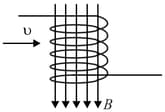
at a velocity (Fig). After a certain time, the electron deflected by the magnetic field leaves the solenoid.
Determine the time during which the electron moves in the solenoid.


Important Questions on Electricity and Magnetism
A metal jumper of mass can slide without friction along two parallel metal guides directed at an angle $\alpha$ to the horizontal and separated by a distance . The guides are connected at the bottom through an uncharged capacitor of capacitance , and the entire system is placed in an upward
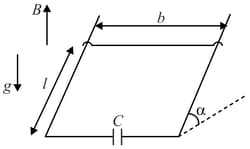
magnetic field of induction . At the initial moment, the jumper is held at a distance from the foot of the "hump".
Determine the time in which the released jumper reaches the foot of the hump. What will be its velocity at the foot? The resistance of the guides and the jumper should be neglected.
What will be its velocity at the foot? The resistance of the guides and the jumper should be neglected.
A quadratic undeformable superconducting loop of mass and side lies in a horizontal plane in a nonuniform magnetic field whose induction varies in space according to the law . The inductance of the loop is . At the initial moment, the centre of the loop coincides with the origin , and its sides are parallel to the and -axes. The current in the loop is zero, and it is released.
How will it move and where will it be in time after the beginning of motion?
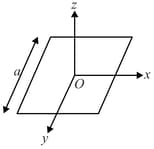
A long cylindrical coil of inductance is wound on a bobbin of diameter . The magnetic induction in the coil connected to a current source is . After rewinding the coil on a bobbin of diameter , its inductance becomes .
Determine the magnetic induction of the field in the new coil connected to the same current source, assuming that the length of the wire is much larger than that of the coil.
Two long cylindrical coils with uniform windings of the same length and nearly the same radius have inductances and . The coils are coaxially inserted into each other and connected to a current source as shown in. The directions of the current in the circuit and in the turns are shown by arrows.
Determine the inductance of such a composite coil.
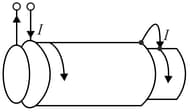
A winch is driven by an electric motor with a separate excitation and fed from a battery of emf . The rope and the hook of the winch rise at a velocity without a load and at a velocity with a load of mass .
Determine the velocity of the load and its mass for which the winch has the maximum power, neglecting the mass of the rope and the hook.
A perfect diode is connected to an a.c. circuit.
Determine the limits within which the voltage between the anode and the cathode varies.

A capacitor of unknown capacitance, a coil of inductance , and a resistor of resistance are connected to a source of a.c. voltage . The current in the circuit is .
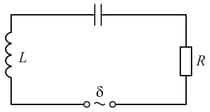
Determine the amplitude of the voltage across the capacitor plates.
Under the action of a constant voltage , a capacitor of capacitance
included in the circuit shown in Fig. is charged to . The inductance of the coill is , and the resistance of the resistor is .
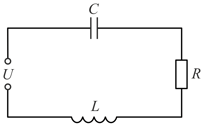
Determine the amplitude of steadystate oscillations of the charge on the capacitor at resonance if the amplitude of the externàl sinusoidal voltage is .
